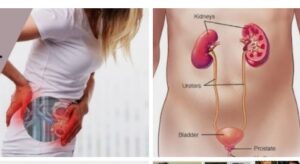Bladder stones, also known as vesical calculi, are mineral formations that develop in the bladder. They are often caused by concentrated urine and can lead to discomfort, urinary tract infections, and other complications. While various factors contribute to the formation of bladder stones, including urinary tract infections and certain medical conditions, diet also plays a crucial role.
Photo credit: Pinterest.
In this article, we will explore the possible causes and symptoms of bladder stones and discuss foods that should be avoided or consumed in moderation to help prevent their formation.
POSSIBLE CAUSES OF BLADDER STONES
According to a publication by Healthline, bladder stones can form when urine becomes concentrated and minerals crystallize. Some common causes include:
1. DEHYDRATION
Insufficient fluid intake can lead to concentrated urine, increasing the risk of bladder stone formation.
2. URINARY TRACT INFECTIONS (UTIs)
UTIs can contribute to the development of bladder stones, especially if they are recurrent or left untreated.
3. URINARY OBSTRUCTION
Any blockage in the urinary tract, such as an enlarged prostate or kidney stones, can hinder the normal flow of urine and lead to bladder stone formation.
4. MEDICAL CONDITIONS
Certain medical conditions, such as bladder diverticula (pouches in the bladder wall) and neurogenic bladder (nerve-related bladder dysfunction), can increase the likelihood of bladder stone formation.
SYMPTOMS OF BLADDER STONES
The presence of bladder stones can cause various symptoms, including pain or discomfort in the lower abdomen or pelvis, frequent urination, urgency to urinate, blood in the urine (hematuria), difficulty passing urine, cloudy or foul-smelling urine, and abdominal bloating or distension.
FOODS TO AVOID EATING IN EXCESS
According to Healthline, to reduce the risk of bladder stone formation, it is advisable to limit the intake of certain foods. While these foods may not directly cause bladder stones, consuming them in excess can contribute to concentrated urine and increase the likelihood of stone formation. Here are some foods to avoid or consume in moderation:
1. OXALATE-RICH FOODS
According to a publication by Healthline, foods high in oxalate, such as okra, spinach, rhubarb, beets, and chocolate, should be consumed in moderation. Oxalate can combine with calcium to form calcium oxalate stones.
2. SALT AND SODIUM
Excessive salt and sodium intake can contribute to water retention and increase the concentration of minerals in the urine. Limit your consumption of processed foods, canned goods, and salty snacks.
3. ANIMAL PROTEIN
A high intake of animal protein, including red meat, poultry, and seafood, can increase the acidity of urine and promote stone formation.
4. SUGAR AND SWEETENED BEVERAGES
Foods and beverages high in added sugars can lead to obesity and diabetes, which are risk factors for bladder stones. Limit your consumption of sugary drinks, desserts, and processed foods.
5. CARBONATED DRINKS
Carbonated beverages can increase urinary calcium excretion and contribute to bladder stone formation. Opt for still water or herbal teas as alternatives.
In conclusion, bladder stones can cause discomfort and complications if left untreated. While diet alone may not eliminate the risk of bladder stone formation, it plays a significant role in prevention.










